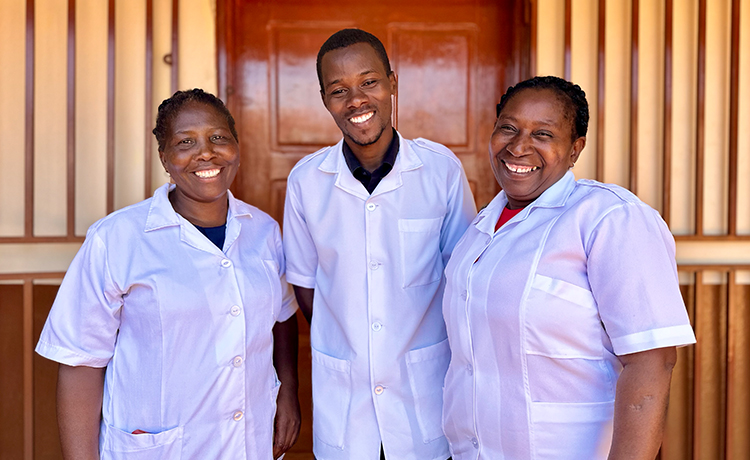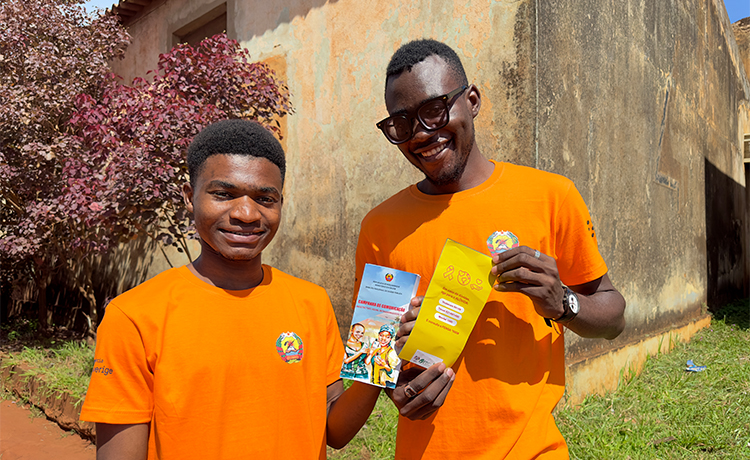News
“It's about our health and our future”: Ensuring sexual and reproductive health support in northern Mozambique
- 17 January 2024
News
NIASSA PROVINCE, Mozambique – Early in the morning, queues begin to form outside the Lichinga health centre in Mozambique’s northwest Niassa Province, as staff prepare to treat patients.
Nearby, health workers offer HIV tests and information about family planning options – a crucial commitment to service provision as communities across the region grapple with violence, insecurity and a series of health crises.
The initiative is particularly welcome for women and girls in Niassa Province, where more than 40 per cent give birth before the age of 19 and where already high HIV prevalence rates are more than double for women, at 10 per cent, than they are for men.
Since 2017, Niassa and the neighbouring provinces of Cabo Delgado and Nampula have faced mounting attacks by non-State armed groups, with millions of people fleeing their homes in search of safety. This has come alongside repeated climate shocks – from flooding to drought and powerful cyclones – and ensuing public health emergencies such as malaria and cholera outbreaks.
The ongoing instability and decimated health facilities have rendered pregnancy and childbirth increasingly life threatening, while conflict and displacement are also putting women and girls at greater risk of gender-based violence and trafficking.

Ensuring services amid crisis
Despite the crisis, the Lichinga health clinic and UNFPA, the United Nations sexual and reproductive health agency, are committed to providing communities with critical health care and gender-based violence response services.
“In five years, the health services have changed, capacities have increased and family planning has started to work,” said Pascoal Vilanculos, who heads the public health department in Lichinga. “With the support of UNFPA now we can do family planning with long-acting methods, and early pregnancies have decreased in the district.”
In Mozambique, only around one quarter of women are using modern contraception – and even fewer in rural areas. This is chiefly due to a lack of services and access that has led to high rates of unintended pregnancies as well as maternal deaths from pregnancy and childbirth complications and unsafe abortions.
To help fill this gap, UNFPA is distributing contraceptives and raising awareness through mobile teams and clinics across northern Mozambique. In Niassa, health providers from all 16 districts have received training on long-term family planning methods, such as the contraceptive pill, implants and intrauterine devices.
Supporting people living with HIV
Through the Lichinga centre, community leaders and volunteers have also spoken to around 2,500 adolescents and young people from the region, discussing cultural barriers to sexual health and the stigma surrounding HIV and AIDS.
“We do this because it's about our health and our future, and the well-being of our families, of those we love,” explained Filipe Jorge, 20, a youth community activist.
“When young people test themselves and the result is positive, I work [with them] on accepting their serostatus. As a community, it's our duty to embrace them.”
Young advocates and activists encourage others to make informed decisions about their bodies and take charge of their reproductive health. They also work with health officials to ensure people can choose the contraceptive options that meet their needs.
“We use this approach in schools to make young people aware of family planning and of HIV and AIDS. That's why we have a condom distribution campaign,” explained José Manuel, director of the provincial health service.

Promoting bodily autonomy
The health centre’s programmes are part of a project funded by the Government of Sweden in Cabo Delgado, Niassa and Nampula provinces, with a particular focus on meeting the needs of vulnerable populations such as LGBTQI+ individuals and people with disabilities.
A collaboration with Rádio Moçambique and Radio Comunitária de Cuamba also produced over 360 broadcasts that discuss sexual and reproductive health services and gender-based violence. Presented in local languages such as Ciyao and Cinyanja and Emakhuwa, the outreach efforts reached around 1.6 million people in Niassa province alone.
“Girls' sexual and reproductive rights are being guaranteed – they choose what to do with their own bodies, as it should be everywhere,” added Mr Manuel.
Read more about how UNFPA teams are reaching crisis-hit communities across northern Mozambique.